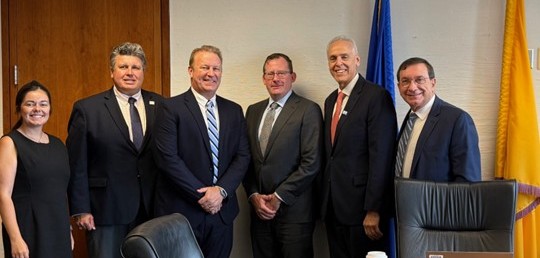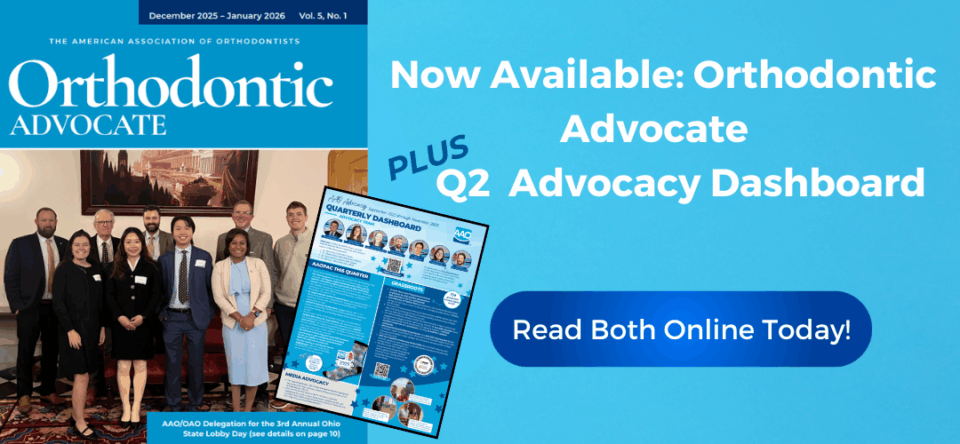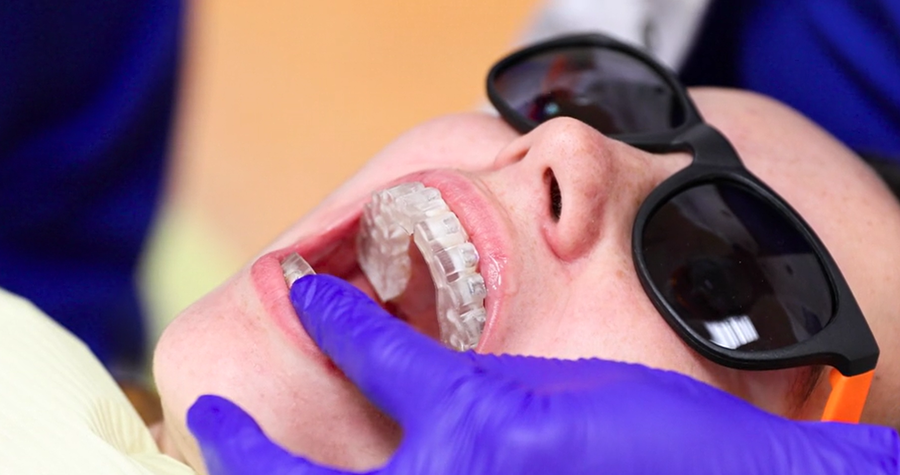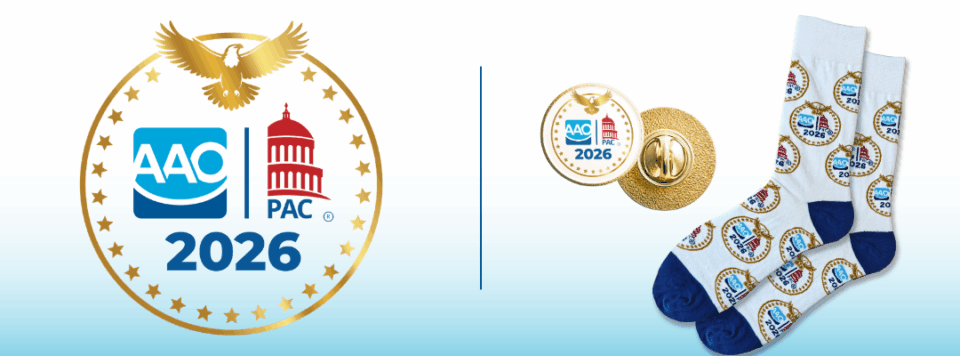A delegation led by AAO President Dr. Steven Siegel carried out a series of strategic meetings on Capitol Hill and with the U.S. Food and Drug Administration in Washington, D.C., in conjunction with the Middle Atlantic Society of Orthodontists (MASO) Annual Session. The MASO meeting took place September 25-27 in the nation’s capital.
U.S. Food and Drug Administration Advocacy for Patient Health and Safety
On September 24, Dr. Siegel, AAO CEO Trey Lawrence, AAO Vice President of Advocacy Nathan Mick, AAO Advocacy Manager Gianna Nawrocki, AAO member Dr. Dan Joseph (AAO National Advocacy Network State Legislative Captain for West Virginia), and Alex Campau with Cozen O’Connor Public Strategies met with key officials during two meetings at the Department of U.S. Health and Human Services.
The delegation was able to share AAO member patient health and safety concerns related to mail-order orthodontic treatment models directly with the U.S. Food and Drug Administration Chief Counsel, Sean Keveny (pictured above, 4th from left), and Jared Seehafer with the FDA Office of Policy. These discussions with current White House Administration officials at the FDA were follow-up conversations from last year, when the AAO led with the previous Administration officials at the FDA.
To complement the discussions, the AAO delegation was able to hand-deliver three important documents to the FDA officials for consideration:
1. A Comprehensive AAO Assessment of the FDA’s own MAUDE Database that includes thousands of clinician and patient submissions related to mail-order orthodontic treatment concerns.
2. A public letter signed by 1,745 AAO members with mail-order orthodontic patient health concerns. The letter submitted by AAO President Dr. Steve Siegel states the following:
“As AAO members and orthodontists throughout the United States, we lend our support to the U.S. Food and Drug Administration to help build awareness of the health risks and harms of mail-order treatment models without an initial in-person examination by a licensed dentist or orthodontist, which is necessary to ensure the patient is truly a qualified candidate for using a Class II medical device. Our collective names of 1,745 AAO members included below from all across the United States indicate public self-attestation for the following:
“I have encountered one or more patients who came to my office to address complications resulting from prior treatment by a direct-to-consumer orthodontic service without an in-person clinical examination.
“I have patient health and safety concerns from a clinical perspective when it comes to mail- order orthodontic treatment models using Class II medical devices (clear aligners) without an initial in-person examination for that type of treatment.“
3. A letter of support from the Academy of General Dentistry joined by nearly 200 of their members including the following message:
“As general dentists committed to patient care and safety, the Academy of General Dentistry members urge the U.S. Food and Drug Administration to raise awareness about the health risks and potential harms associated with mail-order orthodontic treatment models. These models, which often bypass an initial in-person examination by a licensed dentist, fail to ensure that patients are appropriate candidates for using Class II medical devices, such as clear aligners.“
It is important for the AAO to continue proactively advocating for patient health and safety by elevating concerns and sharing concrete data with current FDA officials. The meetings were highly productive and resulted in a commitment by FDA leaders to further explore and evaluate direct-to-consumer (DTC) orthodontic appliances under the FDA purview through their oversight of Class II Medical Devices (including clear aligners).
The FDA Chief Counsel also noted that his neighbor is an AAO member orthodontist and the two of them have also independently discussed these DTC patient concerns. Dr. Siegel noted his connection to that AAO member from the University of Maryland orthodontic residency program.
Congressional Meetings Address AAO Priorities
Gianna Nawrocki, Nathan Mick, Dr. Dan Joseph, and Alex Campau also met with key Congressional staff in bipartisan offices over two days on Capitol Hill to advocate for AAO policy priorities. The discussions were focused primarily on student loan debt challenges for orthodontic residents and AAO members, including the recent impact from changes to federal lending programs when the “One Big Beautiful Bill Act” became law in July 2025 as part of the Congressional budget reconciliation process.
Teledentistry issues related to mail-order orthodontic treatment models were also raised. Dr. Joseph presented several clinical stories from his direct experience and examples retreating patients in his Wheeling, West Virginia orthodontic office after patients were negatively impacted using DTC orthodontic treatment models without an initial in-person examination and radiographs.
Additionally, Nathan Mick met with eleven U.S. Senators and staff over the weekend of October 3–4 to strengthen strategic relationships on behalf of the AAO and engage in direct conversations about a wide range of AAO priorities.
Mr. Mick emphasized the importance of continued engagement with lawmakers, stating: “It is essential that we keep AAO priorities front and center with elected officials in Congress. That advocacy not only ensures strong representation for AAO members on Capitol Hill but also enables Members of Congress to help champion AAO issues within the federal regulatory landscape and at the local level in their home state.”
U.S. Congressman Andy Harris Hosted at MASO Annual Session
Dr. Sana Augustus (MASO Immediate Past President), Dr. Paul Batastini (MASO President), Dr. Lawrence Wang (AAO trustee representing MASO), Jane Treiber (MASO Executive Director), and AAO President Dr. Steven Siegel hosted U.S. Congressman Andy Harris (Maryland 1st Congressional District) at The Mayflower Hotel during the MASO Annual Session opening reception on September 25. Congressman Harris was an anesthesiologist at Johns Hopkins Hospital, a medical officer in the Naval Reserve, and a Maryland state senator before coming to Congress in 2011.
Nathan Mick, Dr. Siegel, and Dr. Wang were able to introduce Congressman Harris to patient health and safety concerns related to mail-order orthodontic treatment models. Congressman Harris indicated his interest in following-up AAO discussions with the FDA by speaking directly with his friend and FDA Commissioner Marty Makary, MD. Congressman Harris enjoyed connecting with AAO/MASO members at the reception hour and learning more about policy priorities directly from orthodontists.
AAO Vice President of Advocacy Nathan Mick noted, “Our recent meetings in Washington, D.C. — with the U.S. Food and Drug Administration, on Capitol Hill, and during the MASO Annual Session — demonstrate AAO strategic advocacy in action. These efforts are powered by our members’ stories and grassroots engagement, including AAOPAC support. We remain fully committed to advancing the policy priorities that matter most to AAO members.”
AAOPAC Continues to Help Fuel AAO Advocacy Success
As the AAO continues advancing policy priorities in Washington, D.C. and across the states, consider supporting advocacy efforts by making a contribution in honor of AAO’s 125th anniversary at AAOPAC.org (using the email address associated with your AAO membership). Your voice and grassroots engagement make a difference!
*View more photos from the delegation’s Washington, D.C. advocacy effort.



